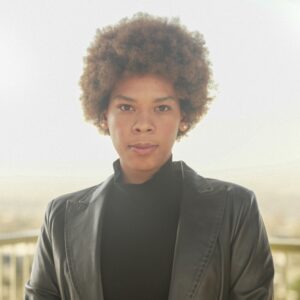 With a bachelor’s degree in sociology and a minor in Spanish behind her, 3L Arin Perkins was trying to decide on a graduate program that allowed her to learn more about social systems and interpersonal dynamics.
With a bachelor’s degree in sociology and a minor in Spanish behind her, 3L Arin Perkins was trying to decide on a graduate program that allowed her to learn more about social systems and interpersonal dynamics.
“I originally thought I would go to school to get a Ph.D in sociology, but after doing some research as an undergrad, I decided I wanted to make a more immediate change,” Perkins recalls. “Sociological academic writings are essential to understanding the inner workings of society and can be used to support legal arguments, but I wanted to take my activism further and enact change through daily legal practice. The law intersects with our lives in so many wonderful and intricate ways and often gives us a chance to reflect on our own belief systems and causes of social disparities.”
After studying on small farms in Uruguay and learning about sustainability and agricultural impact on the environment, Perkins became interested in pursuing a career in environmental justice. However, she is still exploring possibilities within law.
“I came to law school with an open mind and realized that I didn’t want to stick with my original plan. I’ve enjoyed classes like contracts, evidence, and family law and didn’t want to hold myself to one idea of what Attorney Arin looked like,” Perkins says. “Now I am taking a diverse set of classes to expand my knowledge on a variety of sectors of law, still looking for that one class or opportunity that sets off that spark that makes me think, ‘Yes, I can do this day in and day out.'”
The best part of attending the S.J. Quinney College of Law, Perkins says, is the camaraderie between students.
“Here it feels like you know your classmates as people, and that’s really important. Being able to ask classmates for notes, outlines, suggestions is probably what makes S.J. Quinney different from a lot of law schools,” she explains. “There’s definitely competition here because everyone is so smart, but it doesn’t feel like anyone is trying to bring others down. We’re all in competition with ourselves, and it feels good that I can ask my classmates for pretty much anything to improve myself and there’s no animosity.”
Perkins says she is most proud of leaving a legacy of Black Law Day, a program she started her first year of law school because she was shocked to be the only Black person in her graduating class.
“My goal for the program is to create a space where more students can learn about the ins and outs of law school, take a mock class, talk to deans, obtain free LSAT study materials, as well as talk to local attorneys and students in order to encourage more applications of diverse populations. Now, more than ever, it is important to have these programs for students dedicated to supporting minority communities,” Perkins says. “It feels so good to have the support of my community and school in these initiatives to educate prospective law students. This year, we have expanded the program to include a virtual option for historically Black college and university (HBCU) students, and I cannot wait to see what the program turns into in the upcoming years.”
She has also been part of the Minority Law Caucus, the Utah Minority Bar Association’s student subsidiary, for all three years of law school and says their support has been amazing.
“They really care about supporting the students through scholarship and network opportunities. Their programs are very thought-out and intentional, making sure they cater to people dedicated to helping minorities,” she says.
Though she is unsure of her exact career path after graduating from law school this spring, Perkins says she is considering a clerkship and may also be open to trial work.
“I’m most passionate within law about the potential to help people. Often, lawyers think helping people strictly pertains to public service work, but inequity can be found in any workplace or area of law,” she says. “Having people dedicated to calling out discriminatory laws and practices benefits more than indigent clients.”
